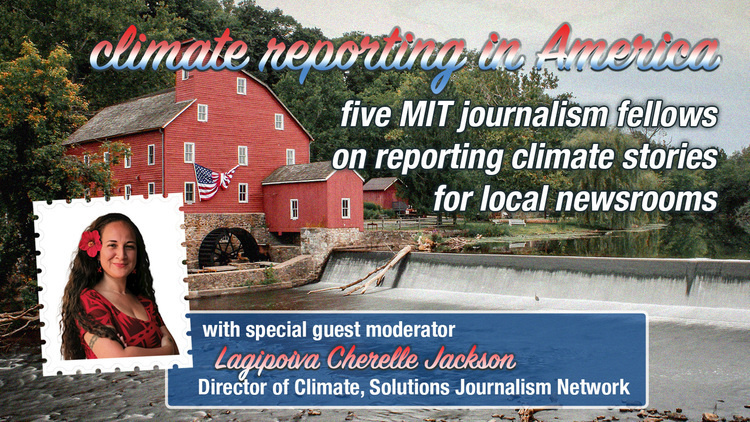
Events
Climate Reporting in America

Americans' most trusted news sources are those closest to home: the local and regional outlets where reporters write about their own communities. As the urgency of climate change intensifies, can these newsrooms help build support and understanding of ambitious climate solutions around the country?
Join MIT's newest class of Environmental Solutions Journalism Fellows as they discuss their work on major reporting projects for news outlets across the United States, covering local implications of the transition to a clean energy economy in Pennsylvania, Texas, Utah and Oregon. Special guest moderator Lagipoiva Cherelle Jackson, Director of Climate Journalism at the Solutions Journalism Network, will lead a conversation with our fellows on the diverse audiences they engaged, how they connected climate solutions to local values and priorities, and the challenges and opportunities of climate reporting for local and regional outlets.
Moderator:
Dr. Lagipoiva Cherelle Jackson is an Indigenous climate journalist and scholar from Samoa in the South Pacific. She is the Director of Climate Journalism at the Solutions Journalism Network. Prior to this role, she was the inaugural Global Climate Collaborations Editor for The Associated Press, where she facilitated the revision of The AP Style Guide chapter on climate change and designed the first global South climate journalism training for The AP. Lagipoiva, a chieftess from the island of Savai'i, has reported on climate change for over 20 years in the Pacific islands for various local and global media outlets, including Samoa Observer, Newsline Samoa, AFP, Al Jazeera English, ABC Radio Australia, New Zealand Herald, CNN, and others. She is also the Co-Chair of Covering Climate Now and a Gender Council Member for the International Federation of Journalists.
Featured Panelists:
Alex Baumhardt is a reporter covering environment and education for the nonprofit news site Oregon Capital Chronicle. Before coming to Oregon, she was a national radio producer and reporter covering education for American Public Media’s documentaries and investigations unit, APM Reports. Her fellowship project reports on opportunities and challenges in the nascent carbon credit markets in Oregon forests and working lands.
Anastasia Hufham is an environmental reporter for The Salt Lake Tribune originally from Birmingham, AL. She covers the Colorado River and the use of Utah’s public lands — like mining, grazing, recreation and energy development. Her fellowship project investigates the resurgence of the uranium industry in Utah, looking at the potential impacts of developing a domestic nuclear energy supply chain.
Brooke Larsen is a journalist based in Salt Lake City, where she reports on water, the energy transition, and environmental justice for High Country News and other outlets. Over the past year, she covered rural communities, agriculture and conservation as HCN’s Virginia Spencer Davis Fellow. Her fellowship project examines the energy transition in Utah’s coal country.
Philip Jankowski is a political correspondent for the Dallas Morning News focusing on energy and the state Legislature. He has covered government, politics, and criminal justice in Texas for 16 years, and has previously worked for the Austin American-Statesman, the Killeen Daily Herald, and the Taylor Press. His fellowship project examines how climate change affects North Texas’ economy and the state politics of renewable energy in the country’s largest fossil fuel producer.
Reid Frazier covers energy for The Allegheny Front, a weekly public radio environmental news show in Pennsylvania. He has covered the impacts of the natural gas, coal, petrochemical, and steel industries, and is a contributor to the NPR Climate Collaborative. For his fellowship project, Reid is reporting on the implications of a ‘blue’ hydrogen hub in Pennsylvania, West Virginia, and Ohio.
About the Fellowship:
The MIT Environmental Solutions Journalism Fellowship supports journalists associated with U.S. local and regional newsrooms in developing high-impact news projects that connect local perspectives, values and priorities with climate change science and solutions. It is part of the MIT Climate Change Engagement Program, MIT's institutional effort to provide nonpartisan, scientifically grounded information on climate change to the public in ways that are relevant and easy to understand. Other flagship projects of the program include the MIT Climate Portal, an online hub for climate learning; the MIT Climate Primer, an interactive "climate science 101"; and the TILclimate podcast.

